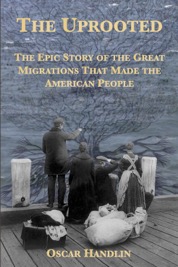 $9.99 on Kindle, Nook, Apple Books, Kobo, Google Play
$9.99 on Kindle, Nook, Apple Books, Kobo, Google Play(cover by Susan Erony)
The Uprooted: The Epic Story of the Great Migrations That Made the American People by Oscar Handlin (107,000 words)
“The Uprooted: The Epic Story of the Great Migrations That Made the American People, which won the 1952 Pulitzer for history, was aimed at an audience of general readers in making his case that immigration — more than the frontier experience, or any other episode in its past — was the continuing, defining event of American history. Dispensing with footnotes and writing in a lyrical style, Dr. Handlin emphasized the common threads in the experiences of the 30 million immigrants who poured into American cities between 1820 and the turn of the century. Regardless of nationality, religion, race or ethnicity, he wrote, the common experience was wrenching hardship, alienation and a gradual Americanization that changed America as much as it changed the newcomers. The book used a form of historical scholarship considered unorthodox at the time, employing newspaper accounts, personal letters and diaries as well as archives.” — Paul Vitello, The New York Times
“[Oscar Handlin] has charged his pages with poetry and feeling... The Uprooted is history with a difference — the difference being its concern with men’s hearts and souls no less than an event.” — Milton Rugoff, The New York Times
“Seldom in our historical literature have we been offered such detailed, realistic pictures of what it meant to come to the New World. The crossing itself, the struggle to make a living in the New World, the problems of housing, social fellowship, religion, adjustment to democracy — a chapter is devoted to each of these. The social and political pressures, the friction and misunderstanding between generations, the awful realization that the adjustment was too great — this reviewer knows of no book that captures these moods and situations with such sympathy and understanding... This is not, in either style or format, conventional or scholarly history... The style is not pedantic or heavy. The author is imaginative, sensitive, understanding. A tremendous amount of research and real depth of understanding lies behind the book.” — Ralph Adams Brown, The Annals of the American Academy of Political and Social Science
“[S]trong stuff, handled in a masterly and quite moving way.” — The New Yorker
“This is a book of fundamental importance. For the first time it attempts to get at the inner meaning of an experience crucial in the development of the United States. It makes the attempt with a back- ground of imaginative research, a perceptiveness, and a literary skill rare in the modern writing of history... no one should attempt serious work in modern American history without fully reckoning with The Uprooted.” — Eric F. Goldman, The Journal of Southern History
“Dr. Handlin’s The Uprooted deserves every bit of the praise and honors that have been heaped upon it. Dealing with an important area of American history without deviating from scholarly standards, the author succeeded in penetrating the façade of historical data to reach the drama of the historical process. The book is not only beautifully written and alive with human interest, but also highly pertinent to current social and political events in the United States... [Dr. Handlin] has handled his material magnificently, and every immigrant and descendant of an immigrant — that is, every American — ought to read this book in order the better to understand himself and his ancestors.” — Solomon Grayzel, Publications of the American Jewish Historical Society
“[T]he best historical interpretation of the inner meaning of migration.” — John Higham, Pacific Historical Review
“Dr. Handlin has discharged his responsibility admirably. An able scholar of immigration history, Dr. Handlin, in the present work... reveals a mastery of historical data and rare insight and understanding of the manifold problems of the immigrant. The book is beautifully written, and many passages are truly moving... Americans would understand their country better if they would read this book and benefit from the humane spirit in which it is written.” — Carl Wittke, The New England Quarterly



